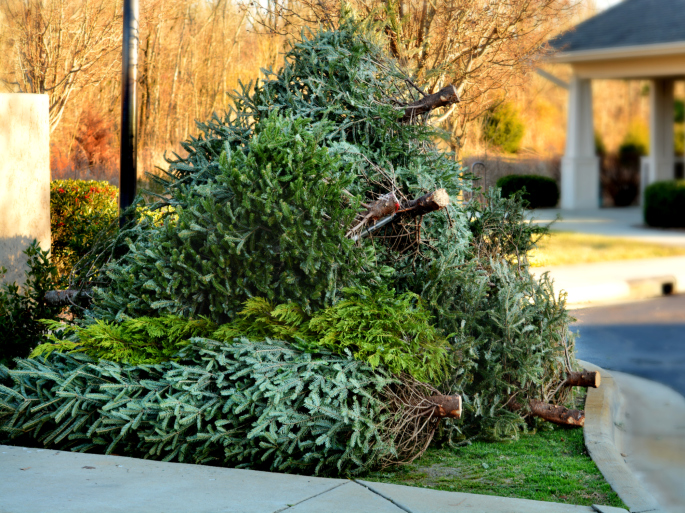Judy Woodruff: And now to our "NewsHour" Shares, something that caught our eye that might be of interest to you, too. With Christmas season over, one question that gets raised almost every year is what to do with all those trees. As Brian Sullivan of PBS station WGBY in Springfield, Massachusetts reports, one farm has a novel solution.
Brian Sullivan: This pile of undecorated Christmas trees serves as a reminder that the holiday season is officially over, which can be a grim prospect for many of us, knowing we still have about three more months of winter ahead. Just don't tell the Nigerian dwarf goats of Hokaheh Farm that. To them, the sound of one of these balsam firs hitting the ground might as well be a dinner bell to a field full of hungry farmhands. Named after a battle cry said to be used by Crazy Horse and his men before the Battle at Little Bighorn, Hokaheh is a hillside farm in the Berkshires. It's owned by a local doctor and home to 19 of these tree-eating goats. Dr. Kerstin Voss bought this 12-acre property in Housatonic back in 2012. But this is the first year since she has been here that they decided to have a Christmas tree drop-off. And as luck would have it, it's a huge hit with the goats.
John Condon: I never knew that goats would eat them until I came here. I posted it on our Facebook page, and it kept getting shared. And next thing I knew, I was getting phone calls and messages from all over the place. And the response has been overwhelming. We're getting a ton of trees. It's really taken off.
Brian Sullivan: While they appear to be going to town on this one-time living room showpiece, a popular misconception is that goats will eat anything. We can probably thank the old Saturday morning cartoons for reinforcing the image of them eating tin cans and anything else that gets in their way. The truth is, goats are actually pickier eaters than many people realize.

John Condon: They basically know what to eat and what not to eat. If something's not good for them or they don't like it, they will shun away from it. They are very clean eaters. If you give them something they really love, like a piece of carrot or a piece of apple, and they drop it on the ground, it's done. They won't touch it. To them, it's dirty. They're cleaner eaters than I am.
Brian Sullivan: It should also be noted that all trees must be clear of ornaments and any other decorative debris before they're to be consumed. Metal hooks and tinsel can do major damage to their stomachs. The goats usually don't eat the trees in their entirety either. But since nothing goes to waste here, whatever doesn't get finished just ends up in the compost pile. The goats here are for breeding purposes only. They share the space on the farm with a donkey, a pony and several chickens and roosters. The whole atmosphere is a little slice of heaven on earth for Condon, who originally came to Hokaheh farm to do a week's worth of work. He's now been here for the better part of a year, and has designs on future endeavors for the farm.
John Condon: It's hard to explain, but, like, the first time I came to this farm, I got a feeling, like this was the place I have always wanted to be my whole life, and here I am. This place, there is just something, I can't put it into words. There's just something magical about being here, having animals who love you as much as you love them, working the land, growing things. It's just, it's incredible. For the "PBS NewsHour," I'm Brian Sullivan in Housatonic, Massachusetts.
Judy Woodruff: A whole new way of about to think about what happens to your Christmas tree.












